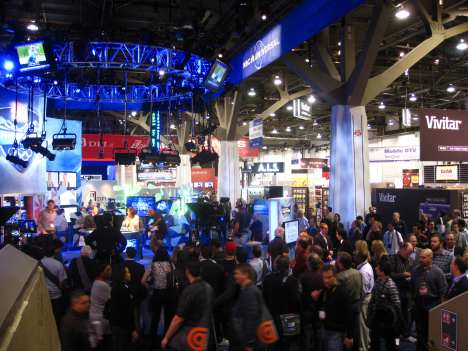Making Holes in Our Heart
[Translations: Japanese]

[CES Image by Jaymi Heimbuch]
I know the feeling. You are wandering around a huge harshly-lit hall full of tables displaying electronic stuff, new devices that all look the same but claim to be different. It is the CES show, the largest consumer electronic show in the world. The hall is overwhelmingly vast. You very quickly don’t care to see any more stuff. It is not different. You despair. The whole scheme of more stuff begins to look trivial, meaningless. You start to think just like this reporter from the floor of CES:
There is a hole in my heart dug deep by advertising and envy and a desire to see a thing that is new and different and beautiful. A place within me that is empty, and that I want to fill it up. The hole makes me think electronics can help. And of course, they can.
They make the world easier and more enjoyable. They boost productivity and provide entertainment and information and sometimes even status. At least for a while. At least until they are obsolete. At least until they are garbage.
Electronics are our talismans that ward off the spiritual vacuum of modernity; gilt in Gorilla Glass and cadmium. And in them we find entertainment in lieu of happiness, and exchanges in lieu of actual connections.
If we are honest, we must admit that one aspect of the technium is to make holes in our heart. One day recently we decided that we cannot live another day unless we have a smart phone, when a dozen years earlier this need would have dumbfounded us. Now we get angry if the network is slow, but before, when we were innocent, we had no thoughts of the network at all. Now we crave the instant connection of friends, whereas before we were content with weekly, or daily, connections. But we keep inventing new things that make new desires, new longings, new wants, new holes that must be filled.
Yes, this is what technology does to us. Some people are furious that our hearts are pierced this way by the things we make. They see this ever-neediness as a debasement, a lowering of human nobility, the source of our continuous discontentment. I agree that it is the source. New technology forces us to be always chasing the new, which is always disappearing under the next new, a salvation always receding from our grasp.
But I celebrate the never-ending discontentment that the technium brings. Most of what we like about being human is invented. We are different from our animal ancestors in that we are not content to merely survive, but have been incredibly busy making up new itches which we have to scratch, digging extra holes that we have to fill, creating new desires we’ve never had before.
I understand why we feel ashamed at how easily we can make ourselves envious and discontent, but I offer this comfort during our despair: It is worth it.
We cannot expand our self, and our collective self, without making holes in our heart. We are stretching our boundaries, and stretching the small container that holds our identity. Of course there will be rips and tears. Late-nite informercials, and cavernous CES halls of unsellable gizmos, are hardly uplifting techniques, but the path to our enlargement is very prosaic, humdrum, and everyday. The only real progress that sticks is boring.


